Recent Posts
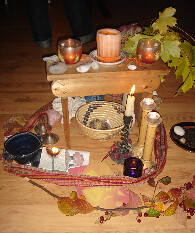
The Truth Mandala at the Blue Room
The first event from the Heart and Soul group took place in the Blue Room last Saturday and explored the work of Joanna Macy. We began with a silent meditation of gratitude for life by remembering a favourite place in nature, a place that we love, feel connected to and sustained by. The following text led us into the meditation: Continue Reading »
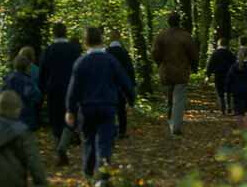 Below are details on our upcoming “Trip to the woods” event on Saturday 15th November. For further information on how to get there click here.
Below are details on our upcoming “Trip to the woods” event on Saturday 15th November. For further information on how to get there click here.
Location: Castlemorris, beside Newmarket, Co Kilkenny
Description of event: This is an easy trail suitable for families around the new 3rd loop in the Castlemorris estate. The walk is 7km long and will take approximately 2 hours.
Nearest town and county: Hugginstown, Co. Kilkenny
How to get there: Start from the village of Knocktopher on the N10 between the cities of Kilkenny and Waterford. Take the R699 in the direction of Kilmaganny and Dunnamaggan. After 6km turn right onto the R701 signposted Kilmaganny – after 1km the trailhead is located on your right opposite the Grand Gates. [Note: The trailhead is signposted from Knocktopher.]
Meeting point: Gates of Castlemorris, Aghaviller, Co Kilkenny
Is pre-registration required?: No
Time of event: 1:30pm
Duration: 2 hours
Suitable for : All the family
Special instructions: All children must be accompanied during this event
General instructions: Trekking shoes + raingear recommended. Bring a drink also.
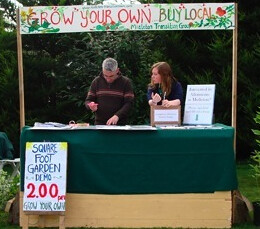
Transition Town Midleton members at the Midleton Food Festival, Saturday 13th September
On Sat 15th November, Transition Town Middleton host a seminar called “Life after Oil” in Midleton Park Hotel. Speakers including Darina Allen, Slow Food Ireland on localising food production, Klaus Harvey from Transition Town Kinsale on the Transition process and Jeremy Gilbert, ex Chief Petroleum engineer for BP. So for those of you who are not attending our own event, a trip to the woods in Castlemorris estate, perhaps this will be of interest.
 According to most commentators on peak oil, the world was endowed with approximately 2 trillion barrels of conventional crude oil that formed once in the Earth’s crust many millions of years ago. It’s amazing to think than over the last 2 generations we have burnt our way through the first half. If we continue at our current rate we will finish off the second half by mid-century.
According to most commentators on peak oil, the world was endowed with approximately 2 trillion barrels of conventional crude oil that formed once in the Earth’s crust many millions of years ago. It’s amazing to think than over the last 2 generations we have burnt our way through the first half. If we continue at our current rate we will finish off the second half by mid-century.
When historians look back at our time it will be defined as a brief moment of 3-4 generations that lived during the fossil fuel age. Our cornucopian belief that we will always come up with a solution and that there are no limits has blinded us from the truth that we are squandering the Earth’s resources and leaving little for future generations.
There are many anecdotes that describe our moment in history but in the clip below, Randy Udall – co-founder of ASPO-USA, likens our situation to 20% of the world’s population sitting around a giant bonfire pilling on 1million tons of fossil fuels every hour. The remaining 80% watch from a distance whilst the fuel gauge heads towards zero. Recorded at the recent ASPO conference in USA it is one of many excellent interviews and presentations on the subject of peak oil and climate change at www.peakmoment.tv
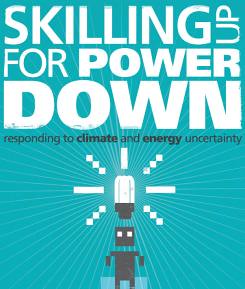 There were many transition town groups present at Cultivate’s recent weekend intensive “Community Powerdown” workshop – including two of us from Kilkenny.
There were many transition town groups present at Cultivate’s recent weekend intensive “Community Powerdown” workshop – including two of us from Kilkenny.
The course is sub-titled “training for leadership, livelihoods and resilient communities”. A bit of a mouthful and daunting at first but what it really boils down to is three simple themes:
Leadership
Anyone who is willing to engage with the challenges of peak oil, climate change and sustainability issues and to work towards the goal of sustainable living both in their own lives and within their communities.
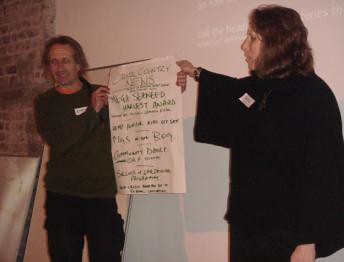
Scenario planning for a positive lean energy future
Livelihoods
Creating and nurturing a lean local economy that is an inevitable outcome of peak oil and a pre-requisite for tackling climate change and resource depletion.
Resilient Communities
First recognising that we currently lack the ability to withstand the shocks that are coming down the line and that we need to become more self-reliant and resilient in terms of energy supply, food security, transportation and local economic activity. Continue Reading »
